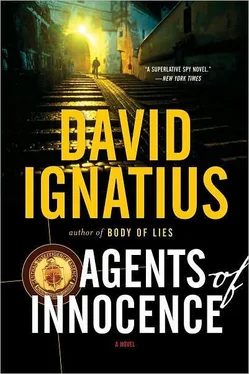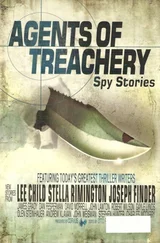David Ignatius - Agents of Innocence
Здесь есть возможность читать онлайн «David Ignatius - Agents of Innocence» весь текст электронной книги совершенно бесплатно (целиком полную версию без сокращений). В некоторых случаях можно слушать аудио, скачать через торрент в формате fb2 и присутствует краткое содержание. Жанр: Шпионский детектив, на английском языке. Описание произведения, (предисловие) а так же отзывы посетителей доступны на портале библиотеки ЛибКат.
- Название:Agents of Innocence
- Автор:
- Жанр:
- Год:неизвестен
- ISBN:нет данных
- Рейтинг книги:3 / 5. Голосов: 1
-
Избранное:Добавить в избранное
- Отзывы:
-
Ваша оценка:
- 60
- 1
- 2
- 3
- 4
- 5
Agents of Innocence: краткое содержание, описание и аннотация
Предлагаем к чтению аннотацию, описание, краткое содержание или предисловие (зависит от того, что написал сам автор книги «Agents of Innocence»). Если вы не нашли необходимую информацию о книге — напишите в комментариях, мы постараемся отыскать её.
Agents of Innocence — читать онлайн бесплатно полную книгу (весь текст) целиком
Ниже представлен текст книги, разбитый по страницам. Система сохранения места последней прочитанной страницы, позволяет с удобством читать онлайн бесплатно книгу «Agents of Innocence», без необходимости каждый раз заново искать на чём Вы остановились. Поставьте закладку, и сможете в любой момент перейти на страницу, на которой закончили чтение.
Интервал:
Закладка:
“The Old Man.”
“Why?”
“Because Fatah opposes international terrorist operations. They are the tactic of madmen and provocateurs. Terrorism harms our cause.”
Rogers looked at him curiously. He found Jamal’s embarrassment more convincing than his speech.
The two men sat side by side on the blanket, legs crossed beneath them, staring west toward the setting sun. The springtime moss was turning a deeper green in the fading light.
Rogers poured Jamal a cup of coffee. The smell of the coffee was intoxicating in the desert air. As he poured a cup for himself, Rogers tried to decide whether to believe the Palestinian. He knew what the specialists back at Langley would say about the list of terrorists. That it was a throwaway. That the Palestinians must have assumed that the Munich police had already obtained the same information during interrogation of the three bombers. That it was an obvious ploy, which made Jamal more suspicious, rather than more trustworthy. Rogers knew the arguments the specialists would make because he had heard them in dozens of other cases. Usually, in his experience, the specialists were wrong. Sitting in Langley, they didn’t see the nervousness on an agent’s face as he met a case officer for the first time, or the look of distaste in his eyes as he took the first steps toward cooperation. They didn’t understand the nuances that made one person believable and another an obvious phony.
Rogers watched Jamal’s discomfort and wanted to say something reassuring. He recalled a passage from an Arab poet named Al-Moutannabi that he had memorized a decade ago while he was at language school.
It was about fate, and he recited it for Jamal in classical Arabic, the language of the Koran:
“ ‘We have walked along the path of life that was laid down for us, as must men whose steps have been ordained.’ ”
Jamal stared at Rogers. He looked tense and unhappy, as if he was about to explode.
“I am not a spy!” said the Palestinian suddenly. “I am not your agent! That is not my fate!”
“Of course not,” said Rogers.
“I am instructed in everything I do by the Old Man.”
“I understand,” said Rogers.
“Good,” said Jamal.
There was silence. The Palestinian, having vented his frustration, seemed to sit a little easier.
“Does anyone else in Fatah, other than the Old Man, know that you are here?” asked Rogers eventually.
“No,” said Jamal.
“That is sensible,” said Rogers. There was another interlude of silence. Okay, thought Rogers. At least it’s clear what he thinks he’s doing. He is an emissary from the highest level of the PLO to the United States. A conduit for information, not an agent. If that explanation makes him feel better, let him believe it. Rogers remembered some advice that an instructor had given him a decade ago. It doesn’t matter whether an agent is a double or a triple. So long as you know which.
“You shouldn’t be ashamed to talk with us,” ventured Rogers. “We’re not quite as bad as you may think.”
The Palestinian smiled for the first time.
“How can I not feel ashamed? Meeting with an American spy in secret in the desert. It is shameful. But do not worry. We Arabs have grown used to shame. It is like our mother’s milk. We live on it.”
The afternoon light was fading.
“Where were you born in Palestine?” asked Rogers.
“I was born in Iraq. My father went there in 1941 to work with the Germans.”
“There is an Arab saying,” said Rogers. “ ‘If she gets pregnant in Baghdad, she will give birth in Beirut.’ Perhaps that is your story.”
Jamal laughed. “You know too many Arab proverbs. Is that part of your spy training?”
“A hobby,” said Rogers.
Jamal lit up a cigarette, cupping the match in his hands to shield it from the wind of the desert. He ran his hand through his jet-black hair so that it blew in the desert breeze.
He is a vain man, Rogers thought to himself. Handsome. Clever. A born operator.
“I am a man who has barely seen his own country,” said Jamal, resuming his story. “We returned to Palestine from Iraq in 1945 but didn’t stay very long. My father was killed in 1948 by an Israeli bomb and my mother and I fled, first to Beirut, then to Cairo. I graduated from Cairo University in 1964. I have been moving ever since: to Kuwait, to Beirut, to Amman, to Europe. I am like the Bob Dylan song. A rolling stone.”
“You listen to Bob Dylan?” asked Rogers.
“I am a child of the 1960s,” said Jamal. “A flower child.”
My ass, thought Rogers. But he was right in a way. There was something about Jamal that captured the spirit of the time. The long hair, the sexuality, the worldliness that he seemed to have soaked up during his years of travel in the Mideast and Europe.
“Let me ask you a question,” said the Palestinian. “Why are you going to so much trouble to meet with me?”
Rogers thought for a moment. Tell him the truth, he said to himself.
“The United States Government wants to establish a direct line of contact with you. They authorized me to take whatever measures I thought were appropriate.”
“But why did you go to Amman during the fighting? You might have been kidnapped or killed.”
“Do you want an honest answer?” asked Rogers.
“Of course.”
“Because I felt that without some personal gesture by me, something that would challenge your assumptions about my organization, the operation would fail. Anyway, it wasn’t really dangerous. Nobody in the Middle East would dare harm a representative of the United States.”
“This is what I like about Americans,” said Jamal. “They are so naive. And so sincere.”
Rogers smiled.
“It is true,” he replied. “We are naive. But in this part of the world, where everyone is so worldly, perhaps that is not such a bad thing.”
“What do you mean?” asked Jamal.
“I’ve spent ten years now in the Arab world,” answered Rogers. “I’ve watched things go from bad to worse. I’ve seen the Arabs turned into cripples, humiliated by their enemies, mistrusted by their friends. Always blaming the Israelis for everything that goes wrong.”
Jamal nodded, It was true. Who could deny it?
“But the Israelis aren’t to blame for the tragedy of the Arabs,” continued Rogers. “I blame the Arabs themselves. They have become corrupted. By money, by the Russians, by too many lies. I truly believe that the only answer for the Arabs-above all, for your people, the Palestinians-lies with the United States. And I believe that we-you and I-can alter this story.”
Jamal clucked his tongue.
“I am serious,” said Rogers.
“What are you saying?” demanded Jamal.
“I am telling you that you and I, personally, can help change the story of the Middle East.”
“How?” answered Jamal. “Impossible!”
“I mean exactly what I said. I believe that a secret relationship between you and me-between Fatah and the United States-can change the history of this part of the world.”
“Your words may be sincere,” said the Palestinian. “But the dream is impossible.”
The sun had set now and the desert was turning chilly. The two men rose from the blanket and walked together back to the beach house.
“Do you have any whisky in the house?” asked Jamal. “I am a corrupted Arab.”
Rogers poured a double Scotch for Jamal and one for himself. He thought for a moment about the tape recorder and decided the hell with Langley. He turned on a radio, near the microphone in the living room. That should drive the transcribers crazy, he said to himself. Hours of Arabic ballads and chanting from the Koran.
“Come out on the deck,” he said to Jamal.
Читать дальшеИнтервал:
Закладка:
Похожие книги на «Agents of Innocence»
Представляем Вашему вниманию похожие книги на «Agents of Innocence» списком для выбора. Мы отобрали схожую по названию и смыслу литературу в надежде предоставить читателям больше вариантов отыскать новые, интересные, ещё непрочитанные произведения.
Обсуждение, отзывы о книге «Agents of Innocence» и просто собственные мнения читателей. Оставьте ваши комментарии, напишите, что Вы думаете о произведении, его смысле или главных героях. Укажите что конкретно понравилось, а что нет, и почему Вы так считаете.












